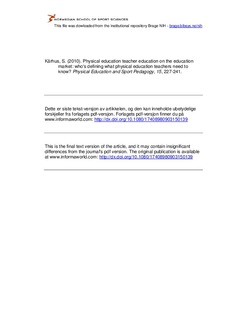| dc.contributor.author | Kårhus, Svein | |
| dc.date.accessioned | 2011-04-07T08:44:47Z | |
| dc.date.available | 2011-04-07T08:44:47Z | |
| dc.date.issued | 2010-03-19 | |
| dc.identifier | Seksjon for kroppsøving og pedagogikk / Department of Physical Education | |
| dc.identifier.citation | Physical Education and Sport Pedagogy. 2010, 15(3), 227-241 | en_US |
| dc.identifier.issn | 1740-8989 | |
| dc.identifier.uri | http://hdl.handle.net/11250/170803 | |
| dc.description | I Brage finner du siste tekst-versjon av artikkelen, og den kan inneholde ubetydelige forskjeller fra forlagets pdf-versjon. Forlagets pdf-versjon finner du på www.informaworld.com: http://dx.doi.org/10.1080/17408980903150139 / In Brage you'll find the final text version of the article, and it may contain insignificant differences from the journal's pdf version. The original publication is available at www.informaworld.com: http://dx.doi.org/10.1080/17408980903150139 | en_US |
| dc.description.abstract | Background: A major consequence of the neo-liberal ideology underpinning recent
reforms in higher education in the Western world has been the significant increase in
the competitiveness of institutions to recruit students in the marketplace of education
and to keep them. Accordingly bachelor degrees relating to physical education
teacher education (PETE) at Norwegian university colleges are being adapted and
developed in order to appeal to today’s market – conscious, educational consumers
interested not only in PETE, but also in a physically active lifestyle, sports and
outdoor pursuits.
Purpose: This study problematizes how the awareness and logic of the marketplace act in
the social construction of PETE curricula and content. The paper asks to what degree
programs within Norwegian PETE are more a reflection of surviving in the education
marketplace than of meeting the needs of physical education teachers in the knowledge
society? Applying Bernstein’s theoretical framework and terms, I intend to analyze how
a regulated market in the national context of higher education forms the conditions for
production, reproduction and transformation of PETE knowledge.
Participants and setting: Four Norwegian university colleges in the field of physical
activity (sport sciences, outdoor pursuits and PETE) comprise the ‘purposeful sample’.
Research design: The qualitative study applies Bernstein’s conceptual framework for
analyses of conditions for production, reproduction and transformation of knowledge
to explore how some forms of knowledge become more valued than others, and asks
who and what, are defining what is seen as important content knowledge in PETE.
Data collection: Data were collected via higher education policy documents, PETE
curricula, the university colleges’ information texts on their websites, institutional
education policy texts and program guides.
Data analysis: By using a content analysis approach, discourses embedded in the texts
were analyzed. In the discourse analysis what is said, not said and the discourses’
‘surrounding texts’ in an education market, regulated by the State, have been related
to Bernstein’s concepts of regulative and instructional discourse.
Findings: The analysis of the texts unveils how content knowledge in PETE degrees is
produced and reproduced among competing interests in the field of sport sciences and
physical activity. Data in this paper strongly indicate that recruitment and
management discourses hold a strong position within the instructional discourse
framing professional programs and courses in a variety of ways. The analyzed texts
provide examples of how meanings and values in the education market, as raw
materials within regulative discourse, underpin the university colleges’ instructional
discourse. There is remarkably little evidence of discourses about essential knowledge
for quality physical education (PE) teaching and learning, or PE teacher professionalism.
Conclusion: Due to the increased competition for institutions to recruit and retain
students, this paper problematizes how the logic of the education market contributes
to the social construction of PETE curricula and content knowledge. Within the
context of deregulated academic autonomy in the Norwegian higher education
system, the content in PETE seems legitimated by the local institutions’ strategic
moves in the market to recruit students and secure their institutions’ economic growth. | en_US |
| dc.language.iso | eng | en_US |
| dc.publisher | Routledge | en_US |
| dc.subject | physical education teacher education | en_US |
| dc.subject | education market dynamics | en_US |
| dc.subject | content knowledge | en_US |
| dc.subject | pedagogical device | en_US |
| dc.subject | pedagogic discourse | en_US |
| dc.title | Physical education teacher education on the education market - who's defining what physical education teachers need to know? | en_US |
| dc.type | Journal article | en_US |
| dc.type | Peer reviewed | en_US |
| dc.subject.nsi | VDP::Social science: 200::Education: 280 | en_US |
| dc.subject.nsi | VDP::Social science: 200::Social science in sports: 330 | en_US |
| dc.source.pagenumber | 227-241 | en_US |
